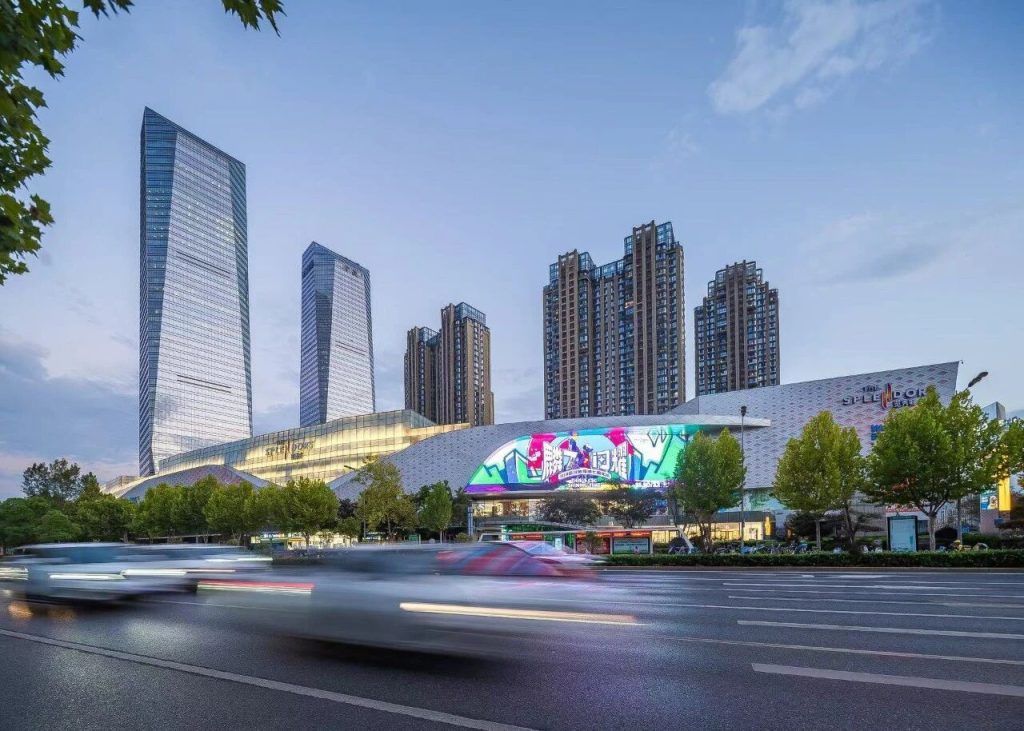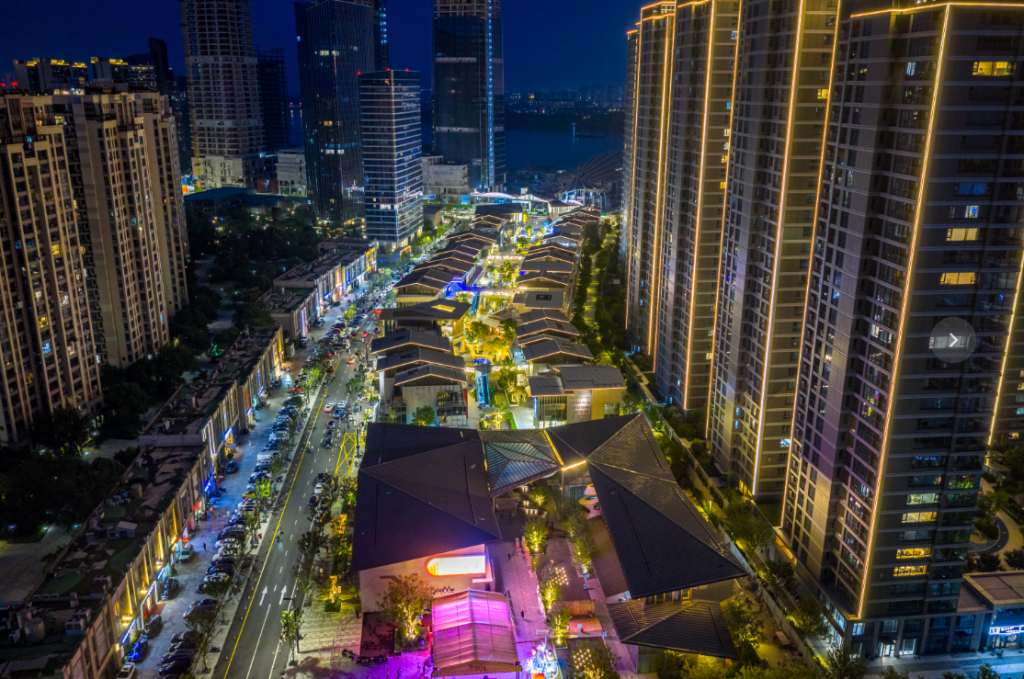The Debut of Jinmao Qinwang Shui Street: A ‘Breakthrough Win-Win’ for Jinmao and Fuyang, Hangzhou
Each new commercial project launch serves as a key milestone in driving the commercial district to ascend the next level. According to data from YingShang, there are currently 8 commercial projects in Fuyang District, Hangzhou, covering a total area of 881,600 square meters. However, since 2021, there has been no increase in commercial projects for the past three years, leading to a severe shortage of new consumption scenarios. In the post-pandemic three-year “window period,” consumer demand, brand trends, and emerging business formats have surged, presenting both challenges and opportunities for commercial operations. It’s a much-needed breakthrough.On September 30, Jinmao Qinwang Shui Street, located in the prime area of Fuyang, Hangzhou, is set to open, marking a significant “upgrade” in Fuyang’s commercial scene. The arrival of Qinwang Shui Street represents a turning point for both Fuyang and Jinmao, bringing extraordinary transformation. The project integrates aesthetic space with the local culture, scaling the first-store economy, fusing local craftsmanship, and even launching a network-wide super IP exhibition, igniting the waterfront cultural tourism commercial boom and elevating Fuyang and Jinmao to new heights in the city’s vision.A Waterfront Commercial Narrative:The three-year hiatus is coming to an end, and Jinmao offers a “city answer” for waterfront commerce. As a leading city operator, Jinmao has been deeply involved in driving urban evolution.
From Shanghai’s iconic Jinmao Tower to the vibrant Jinmao Lanxiu City in Changsha, Jinmao excels at merging ecological elements with commercial scenes. In Fuyang, this philosophy has been implemented once again through the Qinwang “City Eye” integrated development project, which empowers the integration of industry and city and boosts the city’s overall capabilities.As a pioneering component and integral part of the Qinwang “City Eye” project, Jinmao Qinwang Shui Street responds to Hangzhou’s “embracing the river for development” strategy with a new paradigm for waterfront urban living. The project reinterprets the poetic aesthetics of the famous “Fuchun Mountain Residence” painting, transforming the natural ecological resources of the Fuchun River into a valuable space that blends commercial vitality with cultural warmth. The development of Qinwang Shui Street also marks the beginning of a new era in Jinmao’s waterfront commercial narrative.A Brand Power Upgrade:With over 40 first stores and local integration driving its success, Jinmao Qinwang Shui Street will host more than 70 brands, with over 50% of them making their debut in Fuyang, including national first stores, Zhejiang first stores, Hangzhou first stores, and Fuyang first stores. The project features a strong lineup. With its waterfront setting, the first stores and local commercial culture complement and drive each other, forming a commercial pull that covers the entire city of Hangzhou.The project’s F&B offerings will serve as a powerful attraction, with a carefully curated selection of restaurants.

In terms of its restaurant layout, the project builds differentiation along two key dimensions: First, it introduces chain high-quality brands to Fuyang and even the Zhejiang market, injecting international and fashionable elements and expanding consumer horizons. Second, it actively incorporates well-known local brands from Fuyang, upgrading their products and services and combining them with local cultural elements to meet the preferences of local consumers, fostering a mutually beneficial ecosystem between brands and the regional market.Notable first stores at the project include the Zhejiang first stores of Wujiufu, Zhenqiao, and Daijiaodu Japanese Cuisine. The project also showcases well-known Fuyang first stores like Manyunli, Haishadao Seafood Hotpot, and Laotouer Youbao Shrimp. These brands quickly capture market awareness while demonstrating Jinmao’s strong operational capabilities behind hotel commerce.Empowering the Night Economy:Qinwang Shui Street deeply understands that the night economy is a crucial driver for enhancing commercial energy levels. By leveraging the space advantage, the project focuses on developing a night economy matrix. It introduces first stores such as Huayin X-SHOW (Hangzhou), Road Shop (Zhejiang), and the upgraded “Mei Xing” KTV, along with the first stores of.The Berry Wine Bar and “Haokuan” Tavern in Fuyang, covering popular entertainment formats like bars, live houses, and high-end KTV.
This is targeted at young emotional consumption trends, aiming to create a “24/7 destination” for consumers.Among these, Fuyang’s “Haoji” small tavern, known for its high customer loyalty and mature community operations, will also open its brother brand “Haokuan” Tavern at Qinwang Shui Street, creating a significant impact. With Jinmao’s commercial support, the tavern brand expands its influence and deepens its presence in differentiated business formats. These formats not only attract strong consumer interest but also form a complementary, symbiotic commercial ecosystem, further boosting the regional night economy’s aggregation and brand recognition.Blending Popular Formats to Create a Waterfront Lifestyle:Qinwang Shui Street is not just about offering commercial consumption; it aims to create a “slow-living” waterfront lifestyle. Besides high-quality consumables like Miniso and San Sheng, the project introduces signature brands such as “Grandfather Doesn’t Brew Tea” 4.0 (national first store) and “Zerocraft” (Zhejiang first store). The combination of popular outlets like Starbucks, Manner, and bookshelves with these unique stores adds to the charm of Fuchun River’s open space. The rhythm of life is naturally slowed down here, where people can enjoy tea on the riverside, take walks along the waterfront platform, read books in the store, or have breakfast in the light breeze. The project redefines Fuyang’s waterfront lifestyle aesthetics.

An Aesthetic Space Revolution:Qinwang Shui Street spans 45,000 square meters, with a 430-meter-long waterfront promenade as the main axis, seamlessly connecting various scenic spots such as the theater square and sculpture plaza. The project is designed around themes such as “Flower,” “Moon,” “Night,” and “Spring River,” offering an immersive experience that breaks the boundaries of traditional box-shaped commercial spaces and enhances spatial continuity. Walking through, every corner surprises and evokes cultural awareness, extending the customer’s experience.Above the water, the non-heritage “Water Moon” sculpture, created by the artist Wang Linghua’s team, is inspired by the theme of the moon, representing both non-heritage culture and local traditions.Complemented by lighting and mist effects, the sculpture’s ambiance shifts between day and night, creating a “check-in” effect that becomes a unique immersive landmark of the project.Breaking the Urban Commercial Barrier:Qinwang Shui Street’s opening will undoubtedly create a city-level event. With a strong mix of differentiated brand content and spatial narrative, the project will use large-scale events and visual spectacles, including a 500-drone performance and waterfront laser shows, to ignite topics and quickly build brand recognition and city influence. It will also host events such as “Travel Into Dream” Waterfront Music Festival, “Travel Into Market” Pop-up Market, and intangible cultural heritage parades, covering young crowds and families while creating a multifaceted experience.
The project also caters to niche interests, hosting events like a pet sports competition and land-challenge race, enhancing its social engagement and user loyalty. Additionally, it will hold art exhibitions authorized by the Hangzhou Cultural Expo, further enhancing its cultural value and contributing to long-term content creation for continued operations.A Preview of Urban Commercial Evolution and Win-Win:The opening of Qinwang Shui Street is destined to be a breakthrough and win-win moment for Jinmao and Fuyang. By activating consumer power through scene-driven strategies and reshaping urban identity through culture, it injects a new lifestyle combining “refined vibrancy” and “waterfront relaxation” into Hangzhou. As a groundbreaking project in waterfront commerce, it marks a crucial step in Fuyang’s transition from traditional commercial districts to the “waterfront cultural commercial era.”And this is just the beginning. Jinmao Hotel and Commercial will continue to expand its diverse and high-energy commercial landscape, using Qinwang Shui Street as a new anchor. With the upcoming opening of Jinmao Lanxiu City next year, the Qinwang “City Eye” section will gradually fulfill its blueprint for “industry-city integration,” offering a model of ecological aesthetics and commercial vitality for urban renewal in the Yangtze River Delta.From Fuchun River to Qiantang River, the continuous flow marks the successful collaboration between Jinmao and Hangzhou in their mutual journey toward urban and commercial transformation.